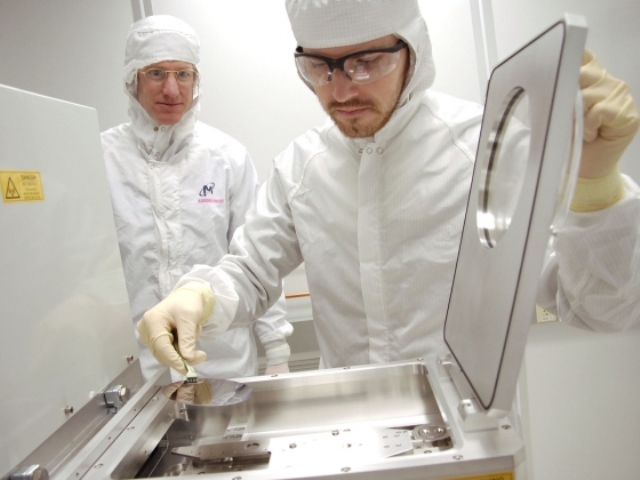Sep 21 2015
The National Science Foundation has awarded $3 million for the creation of a new nanotechnology center at Montana State University.
 Electrical Engineering Professor David Dickensheets, left, and student Erwin Dunbar work with silicon wafers in a facility at Montana State University in Bozeman. MSU photo by Kelly Gorham
Electrical Engineering Professor David Dickensheets, left, and student Erwin Dunbar work with silicon wafers in a facility at Montana State University in Bozeman. MSU photo by Kelly Gorham
The grant, which was announced today, is part of an $81 million, national effort to boost American research and development in a fast-growing and promising field that requires very specialized equipment and expertise. Nanoscience and nanotechnology – the study and application of extremely small things – are pushing the envelop in the full array of science and engineering fields.
The Montana Nanotechnology Facility (MONT) at MSU will provide researchers from academia, government and companies large and small with access to university facilities with leading-edge fabrication and characterization tools, instrumentation and expertise within all disciplines of nanoscale science, engineering and technology.
MSU was a natural pick to host as a center because it has a number of laboratories where the frontiers of nanoscience are being pushed in new directions, said David Dickensheets, professor in MSU’s Electrical and Computer Engineering Department and the principal investigator for MONT. The site in Bozeman, which also will include partner institution Carleton College, in Northfield, Minn., will leverage five existing high-tech labs at MSU for the expansion of research beyond the university’s walls.
The labs included in the MONT site are the Montana Microfabrication Facility, the Imaging and Chemical Analysis Laboratory (ICAL), the Center for Biofilm Engineering (CBE), the Mass Spectroscopy Facility and the Center for Bio-Inspired Nanomaterials. These multidisciplinary facilities are housed in MSU’s College of Engineering and College of Letters and Science. Along with Dickensheets, the MONT site effort includes a number of co-principal investigators: Recep Avci, research professor of physics and director of ICAL; David Mogk, professor of Earth sciences; and Phil Stewart, professor of chemical and biological engineering and CBE researcher.
At MSU, research at the CBE is looking at how nanoengineering of biofilms can turn bacteria into an ally in fighting environmental pollution or infections caused by medical devices. Research in the Center for Bio-Inspired Nanomaterials is targeting the structures of viruses that are found in Yellowstone’s famous springs among single-celled organisms that thrive in extreme temperatures and acidity or alkalinity conditions. In addition, state-of-the-art scanning electron microscopes and mass spectrometers enable the MSU research community to collect critical data on the structure of nanomaterials they are engineering and studying.
Dickensheets said the NSF funding would help MSU add instruments to further its capabilities in nanotechnology research. For instance, MONT will purchase a new tool for ICAL that can detect the chemical structure of a material at a resolution of up to four nanometers. Put another way, this will allow researcher to get characteristics from a section of material that is 40-50 atoms in width.
That capability exemplifies how nanotechnology has pushed into new frontiers, Dickensheets said. Over the past decade, huge advancements in nanofabrication, microscopic imaging and spectrometry sensing have led to the discovery of applications in a diverse array of industries, from health care to energy and beyond.
Dickensheets said the pioneering nature of these high-tech research endeavors enhances the education offered to MSU students. MONT will have a significant education and outreach component, providing educational opportunities for K-12 teachers, undergraduate course work and independent study projects and advanced training for graduate students to prepare the future workforce in nanotechnology.
“These labs offer undergraduates and graduate students cutting-edge places for education and training,” Dickensheets said. “In continuing to push the boundaries of science and engineering, in preparing students to enter the workforce with this kind of experience and in bringing users from the private sector to MSU to share in our equipment and expertise, this MONT site really hit on all of our land-grant university missions of education, research and outreach.”
“The Montana Nanotechnology Facility will help promote discovery, education and outreach related to nanotechnology by providing access to shared-use instruments, expert training on their safe and effective use, and broad-based education about nanoscale science and technology for learners at all levels who come from diverse communities, both here in Montana and beyond,” Dickensheets said.
The $3 million grant will be distributed over five years and is part of the National Nanotechnology Coordinated Infrastructure (NNCI) framework, which builds on the National Nanotechnology Infrastructure Network (NNIN), which enabled major discoveries, innovations and contributions to education and commerce for more than 10 years.
"NSF's long-standing investments in nanotechnology infrastructure have helped the research community to make great progress by making research facilities available," said Pramod Khargonekar, assistant director for engineering at the NSF. "NNCI will serve as a nationwide backbone for nanoscale research, which will lead to continuing innovations and economic and societal benefits."
The awards are up to five years and range from $500,000 to $1.6 million each per year. Nine of the sites have at least one regional partner institution. The 16 sites are located in 15 states and involve 27 universities across the nation.
Contact: David Dickensheets, (406) 994-7874 FREE, [email protected].
Source: http://www.montana.edu/